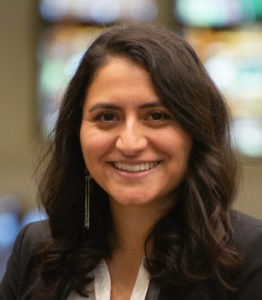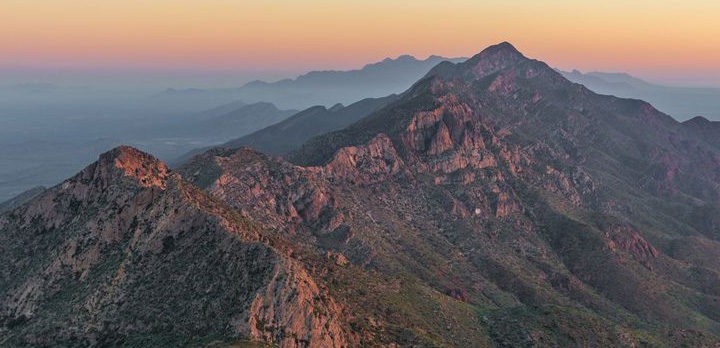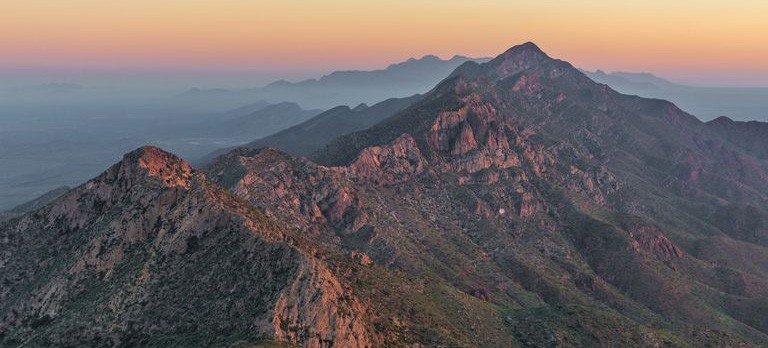Hot, tumbleweeds, dry, brown, desert, mountain. These are words often used to describe El Paso, Texas. When I think of El Paso, I think of the sun kissing my skin. Heat enveloping me like the embrace of a long-lost friend. Dirt the color of my cinnamon skin. I think of climbing to the top of the Franklin Mountains and seeing miles and miles of land, with the undistinguished borders between Mexico, Texas and New Mexico.
What I love about the desert is that you cannot hide. You are exposed. My whole life I have been running and hiding. Running away from pain, from anger, hiding my wounds.

Nataly Mora
The desert did not let me do that. She uncovered me. She healed me. It was in her warm embrace that I was able to reflect upon my life, my pains, and see that the rest of my journey does not have to be this way, that I can leave those wounds behind.
When thinking of the desert, “life” is not usually thought of. Yet if you pay close attention, you will see that the desert is bursting with life. You have the cactus that gives the delicious fruit of tunas (prickly pears), you see the tall palm trees, the yucca plant with its beautiful white flowers, and you have the little critters hiking alongside you. El Paso is my sacred place and where I came to life.
I am a daughter of Mexican immigrants and grew up in Frisco, Texas. My first language was Spanish, and I learned English in school. I was in bilingual classes up until third grade with kids who looked just like me and had lives like mine. We were Spanish speakers from the lower-income part of town who were learning English. At the end of third grade, I, along with two classmates, were placed in an English-only classroom. In fourth grade, the three of us were moved to a new school and each placed in separate classrooms. I remember trying to make friends with the girls in my class, but for some reason they did not want to be my friend.
As an 8-year-old, I came to associate their unresponsiveness to what I could perceive with my eyes. They had blond hair, blue eyes, light skin. I had brown hair, brown eyes, dark skin. My English sounded a little different, and I rode the bus that came from the trailer park, unlike those who walked to school from the beautiful homes.
Little by little I began to disassociate myself from the children in my class. It didn’t make sense to try if I was only going to be rejected. I would hang out with the other three Latinas during recess and on the bus drive home. In class, I would fade into the background. I would try not to speak out so that my slight accent would not further differentiate me.
“There is irony to the healing I experienced in El Paso.”
Unconsciously, I carried this pain with me into adulthood. I carried the lie that Caucasian people did not want to be my friend. This is a lie that has resurfaced now that I am back in a school setting. At least now, I am aware of it. When that pain wants to resurface, I return to my sacred space, the desert.
Everything changed in El Paso. For the first time, I was not a minority and did not feel out of place. There is irony to the healing I experienced in El Paso. I grew up in a Spanish-speaking church, with a Latino pastor. In El Paso, I was a member of a predominantly Caucasian English-speaking church with a white pastor.
First Baptist Church of El Paso is a component of my sacred space. This church was the El Paso heat that embraced me. For the first time in my life, I did not feel different because of how I looked or what part of town I grew up in.
It was in the desert, at the age of 24, that I made my first white friend, Nicki. Before Nicki, all my friends had been Latinas/os. A friend is someone who knows your story, who knows more than the superficial, who you share your fears and your dreams with. Nicki and other members from First Baptist, El Paso, gave me something I always had longed for but never received: They gave me friendship; they showed me that I was familia, and they showed me that I truly belonged.
“This church opened her doors and gave me a place to call home.”
After feeling displaced for so long by society, this church opened her doors and gave me a place to call home. Not only did they welcome me, but they embraced me. They gave me a seat at the table, they listened to me, they created a safe place for me. They did not require for me to leave my Latinidad and assimilate to them. They loved me and accepted me for me. Their genuine and intentional friendships brought redemption to the brokenness of racial trauma I had experienced as a child between Latinos and whites.
El Paso is my sacred space because in her desert, at the top of the mountain, I no longer could hide the hurt I had experienced as a child and had carried into my adulthood. At the peak of the mountain, God showed me that just as I could not differentiate the borders between Mexico, Texas and New Mexico, God never had differentiated me from others — and his bride, the church, showed me this.
Through those redemptive relationships, in such a sacred place, the church became a place of healing for racial trauma. It is in El Paso that God affirmed my calling into ministry. It was in the desert that I learned more about who God was and who I am in God.
The desert did not lead me to death; on the contrary, it brought me to life.
Nataly Mora is a master of divinity and master of social work student at Baylor University and its Truett Seminary. She serves as an intern at the Center for Church and Community Impact and as a pastor at Park Lake Drive Baptist Church in Waco, Texas.


